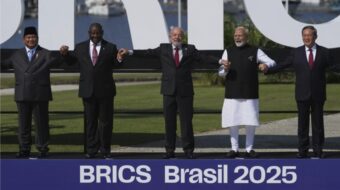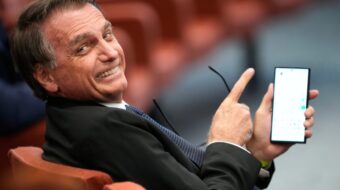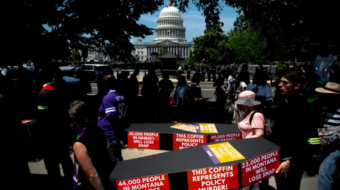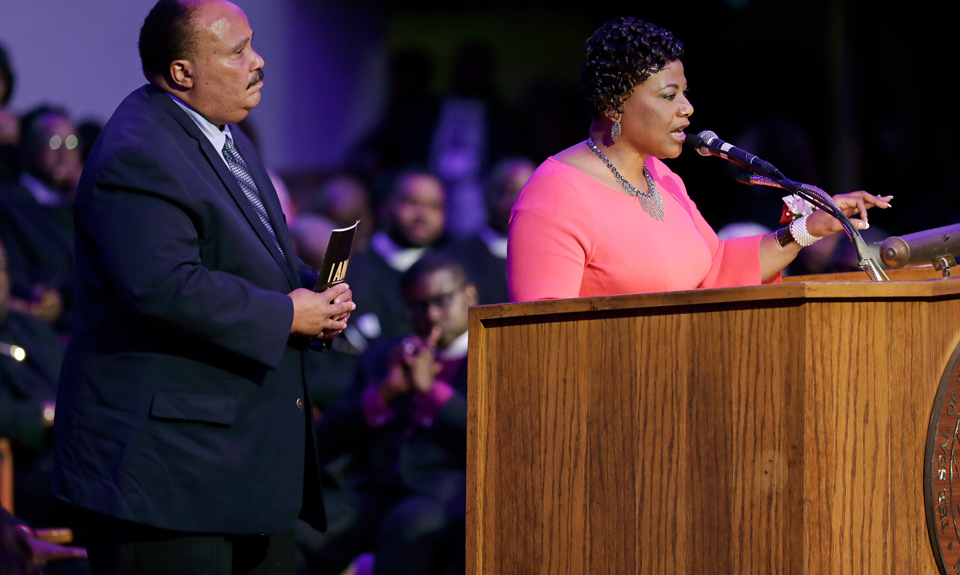
MEMPHIS—It has been 50 years since the world lost civil rights visionary Martin Luther King, Jr. His speeches and activism resonated with so many, and ripples of his influence continue to be felt today. At the time it happened, his murder devastated Black Americans and supporters of the civil rights struggle across the country. This was especially true for those who were closest to King, and perhaps the most affected by his death—his children. But the baton of his struggle is carried on today.
And like others who walk in King’s activist footsteps today, they want the world to know more about their father’s true analysis of the world, as opposed to the, at times, domesticated and less radical image that official society has tried to paint of him. People’s World and other members of the press were able to sit down with two of King’s surviving children, Martin Luther King III and Bernice King, during the IAM2018 Conference in Memphis this week. In their conversations with reporters, they reflected on their father’s legacy, the need to remember his fight, and their hope for the future of the struggle for equality and true democracy.
Human rights advocate Martin Luther King III is the oldest son of Dr. King and Coretta Scott King. He was accompanied by his wife, Andrea Waters, and their nine-year old daughter, Yolanda Renee King. Yolanda recently made headlines for speaking at the March for Our Lives demonstration in Washington, D.C. on March 24, already showing that her grandfather’s activism lives on, even in the youngest generation of his family. King III told People’s World at the round table that he had a mixture of feelings regarding the 50th anniversary of his father’s assassination.
“I was here [in Memphis] for the 45th anniversary, and this 50th, as we approach the actual date of dad’s assassination, I was thinking about the fact that he left our home, on this date [April 3] fifty years ago, around the same time our flight left. I distinctly remember my brother and I actually pleading with him not to leave. Not sure why, but I distinctly remember not wanting him to leave. But I remember him saying ‘I’ll be back’… On the one hand, I’m emotional being in the place [Mason Temple] where he gave his last speech. Yet, while I’m reflecting on the past, I’m very excited about the future,” King stated.
Referring to the March for Our Lives movement, he went on to say, “This is the first time in over 50 years, in fact it’ll be 55 years, since a high school-led student movement has occurred. That is absolutely incredible. These students are not following, they are leading us. We as adults, we have failed our children.”
Thinking of how the timeline of recent mass shootings coincide with the anniversary of his father being slain with a gun, King explained further, “Not only was my father assassinated with a gun, my grandmother—my father’s mother—was shot and killed while in church. So the question of gun control has been important to my family for years.”
Speaking more on movements happening now, King highlighted Black Lives Matter and its relation to his father’s legacy. “I’m excited about the future because of movements like Black Lives Matter. That, unfortunately, has to continue to mobilize because African-American men keep getting shot down. I’m proud of the fact that those young people, of all colors, can see the injustice, and the wrong, and want to come to the table and aim for a better society.”
Including the fight against sexual harassment, he said, “This includes the #MeToo movement. It is so significant in the country and around the world. It’s the first time we’ve seen the women’s movement—not just emerge, because it’s been engaged before—but this is the first time our society is being forced to address gender equality, and it will be done.”
King then began to speak on his father’s radical ideas on economic reform—something not often highlighted in history books. “Quite frankly, I would say there were a number of reasons he was killed. He was talking about a radical redistribution of wealth,” King said. “He was talking about a living wage in 1967 and 1968. We’re still trying to raise the minimum wage… What is probably most tragic is that we live in a nation that has a twenty-plus-trillion-dollar economy, and we have the audacity that there are 48 million people—it was about 38 million when dad was alive, and it’s probably closer to 60 to 70 million people—that we refuse to acknowledge,” he stated, referring to recent statistics that show close to 48 million people in the nation live in poverty.
“You have to create opportunity so people have options,” King noted. Remembering a saying of his father’s, he said, “Dad used to talk about, ‘Yeah, it’s alright to tell someone they have to pull themselves up by their bootstraps, but it’s an insult to say to a bootless person to pull yourself up by your own bootstrap.” Noting the problem of poverty, “We are still there. We haven’t made much progress. Some individuals have made enormous progress, but the reality is the masses have not.”
Referring to the white-lash evident in the 2016 U.S. presidential election, where many white working people voted for Trump, who pushed a racist and bigotry-filled agenda, King explained, “People in America today are really struggling and suffering. Masses of people. When people struggle and suffer, they’re looking for someone to blame. So we’ve created a divisive society that causes racism and other things to emerge. To me, that is a remedy and formula for disaster. Income equality has got to be addressed. We cannot live in a society where one percent controls most of the wealth.”
When speaking on the legacy of his father, King stated, “I think individuals certainly perceive his work, but I really believe that even the masses of people have yet to really understand Martin Luther King, Jr. and his real mission. Mainstream media promotes the vision of a dreamer. Dreams do come true, but sometimes they don’t. He is actually watered down. The revolutionary that he really was is not yet appreciated by the total population. We have a lot of work to do. My wife refers to it as ‘democratizing’ the King legacy. People have to understand it’s not just about idolizing him, but it’s about living the ideals. It’s about a revolution of values.”
King’s youngest child, minister Bernice King, echoed her brother Martin’s sentiments regarding her father’s less explored radical legacy.
“My father left us with a very valuable blueprint for social change,” she said. Speaking to the incomplete picture of her father’s work she stated, “The story is told up until Chicago. They don’t tell the story of how he began pushing for open housing, opposing the Vietnam war, and starting Operation Bread Basket. That part of my father’s legacy isn’t talked about as much. We have to focus more on this,” Bernice King noted.
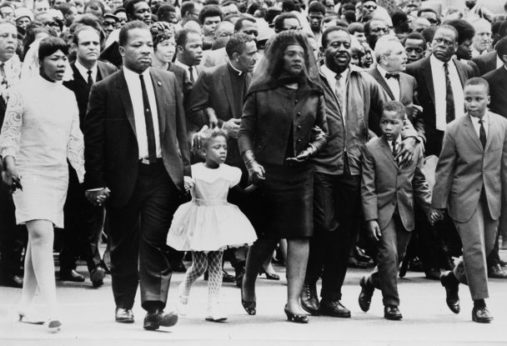
Going further, she expounded upon the triple evils Dr. King talked about often, a theme that gets passed over in favor of the more fantastical “Dream” rhetoric. “My father spoke on the triple evils that threaten us as a society. He called those evils poverty, racism, and militarism. [Addressing these evils] is going to require a fundamental shift in values. It will require a fundamental shift in our entire economic system.”
Bernice King also revealed that one of her father’s last speeches, which he was never able to deliver, was to be titled, “America May Go to Hell.”
Putting forth a challenge to the new generation of activists, such as the Black Lives Matter movement, which she praised, Bernice King added, “Sometimes in our zeal for change, we don’t connect the dots. My father pushed for legislation and policy change, and also the economic component. I challenge the new generation to do this as well. To strategize concretely and focus on their demands.”
Both children of the late Dr. King concluded the interviews with a similar thought regarding the need for a revolution of values. Echoing their father’s words they noted, “When you have a revolution of values, then you have a foundation to really change things. We must create a culture of non-violence or we will face non-existence.”



